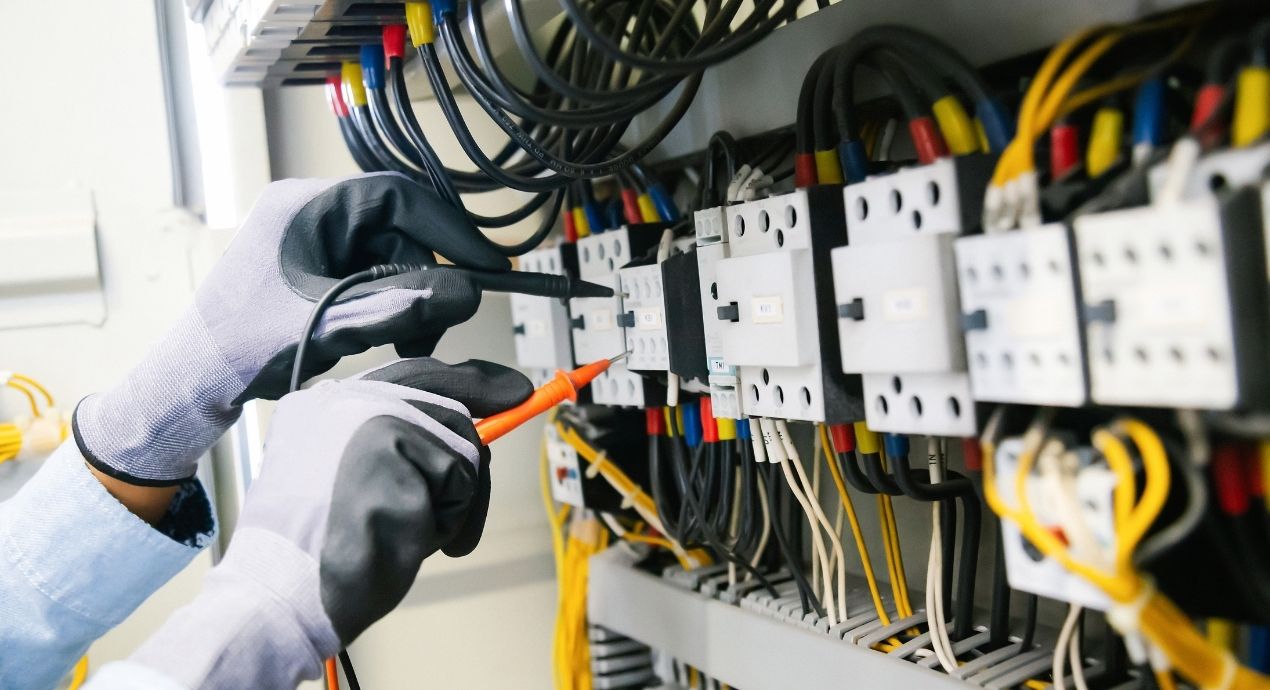
Contemplating coverage?
Subscribe to receive our emails & get
$200 OFF!
Have questions?
Call us: (833) 544-8273


Written By Erin Easley
A home’s electrical network is a complex system with a multitude of interconnected components. In-wall wiring, circuit breakers, outlets, and electrical fixtures are enough to think about, but in older homes, there’s also the possibility of dated wiring and materials that are no longer up to code. Faulty components, electrical wiring problems, and old materials can lead to everything from flickering lights to a full-on housefire.
In this article, we’ll review some common electrical problems in home systems. We’ll also share how to resolve these home electrical problems most efficiently.
Before we dive in, remember to always exercise extreme caution when troubleshooting electrical problems. Always defer to a licensed electrician to rewire outlets, switches, junction boxes, circuit breakers, and mounted electrical fixtures.
There’s a reason Liberty Home Guard was rated the #1 Home Warranty Service by U.S. News and World Report for 2021, 2022, 2023, and 2024. Check out our services.
Learn MoreOver time, the contacts in a receptacle or outlet wear down, making it easier for a plug or cord to slip out. This isn’t only a nuisance; it’s also quite dangerous. A loose contact can lead to arcing, or electricity “jumping” from one point to another. Arcing is a significant fire hazard, as the arc can ignite dust, wood, or other in-wall debris.
Resolving this problem is as simple as replacing the receptacle, which costs only a few dollars. Changing a receptacle isn’t especially difficult, but there is the danger of a fatal electric shock if power to the circuit is not shut off. For most people, it’s best to leave it to an electrician.
Older homes are more likely to have ungrounded receptacles, or receptacles with two openings instead of three. This is a problem because excess electrical current has no safe place to travel. It also prevents you from plugging in devices with three-prong plugs. (Never use an adapter or extension cord to use an ungrounded outlet to power a device with a three-prong plug. This can fry the device and poses a danger to the user.)
This is usually easily resolved by replacing the receptacles with grounded ones. There is a chance that the in-wall wiring will need to be updated, though.
Over-lamping is when a light fixture is fitted with a bulb with a higher wattage than the fixture is meant to handle. This is a greater danger than many people realize. A hot bulb can damage the fixture’s socket and adjacent wiring. This can lead to arcing, which in turn can cause a fire.
Fortunately, this is an easy one to fix yourself. Check all light fixtures to ensure the bulbs are at or below the wattage limits. If the limit isn’t marked, use a 60-watt bulb or under to be safe.
A ground fault circuit interruptor (GFCI) outlet is a modern receptacle that can detect minor changes in an outlet’s electrical current. This means it can shut down power in the case of human contact or exposure to water. In simple terms, GFCIs are safer than conventional outlets.
GFCIs are especially important in bathrooms and kitchens. If your home is missing GFCIs, you can find them at any hardware store. Installing one is similar to installing a conventional receptacle.
Junction boxes are often locations where high-voltage electrical wiring is spliced together. Though these splices should be secured with plastic clips and perhaps electrical tape, there is still the danger of electrocution.
If you notice uncovered junction boxes anywhere in your home—including your garage, attic, or basement—spend the few bucks to get some covers. These are easily installed with nothing more than a screwdriver.
On/off and dimmable switches can fail for a number of reasons. It could be loose wiring, arcing, or wear and tear on the plastic pieces. In any case, it’s best to fix the switch to avoid a potentially dangerous situation.
Replacement switches are usually inexpensive, but it’s best to have an electrician install them.
Over-wiring is when a panel is wired to more circuits than it’s meant to manage. This can lead to problems with your circuit breaker or, in older homes, electrical fuse box problems.
Fix an over-wired panel by adding a subpanel. You can also swap out your existing panel for a larger one. You’ll want the help of an electrician.
The above electrical problems do not constitute an exhaustive list. There are countless issues that require the help of a trained professional. A Liberty Home Guard home warranty can provide that help affordably and at a moment’s notice.
Use our website or call (866)-225-7958 to learn more about our electrical systems coverage. We can also customize your policy to include lighting fixtures coverage, home electrical appliance insurance, extended warranty electrical appliances coverage, and much more.
Stay Ahead of Potential
Home Mishaps!
Subscribe to our Liberty Home Guard Newsletter and gain access to exclusive content that ensures your peace of mind.